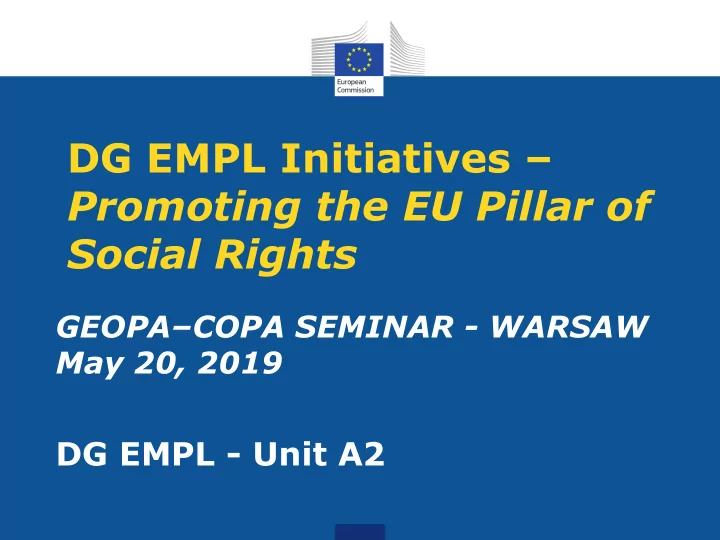

DG EMPL Initiatives – Promoting the EU Pillar of Social Rights GEOPA – COPA SEMINAR - WARSAW May 20, 2019 DG EMPL - Unit A2
Overview • Priorities of the Juncker Commission • The new Start of social Dialogue • The European Pillar of Social Rights • Initiatives by the Commission • The European Labour Authority
New Start of The European Pillar of Social Rights Social Dialogue "The social market economy can only work if there is social dialogue. (…) Now it must be resumed at national and especially at European level. I would like to be a President of social dialogue .” Jean-Claude Juncker in his political guidelines A new Start for Europe , 2014 "The European Pillar of Social Rights is not a poem. It is first of all a programme of principles but also an action plan." "If we want to be credible, we have to deliver." Jean-Claude Juncker during the Social Summit for Fair Jobs and Growth in Gothenburg, 17 November 2017 3
Unemployment in the EU is decreasing steadily since 2013 25.0 Unemployment rate, % of the labour force 20.0 15.0 10.0 5.0 F orecast 0.0 2006 2007 2008 2009 2010 2011 2012 2013 2014 2015 2016 2017 2018 2019 2020 Worse 3 vs. Best 3 E U28 E A19 US The speed of decrease varies across Member States • The unemployment rate is approaching its 2008 low • point (2018, December: 6.6%) 4 Source: Eurostat EU LFS
Challenges in EU Working-age millions Population (20-64) 307 287 267 247 Active population 227 207 Employment 187 2000 2002 2004 2006 2008 2010 2012 2014 2016 2018 2020 2022 2024 2026 2028 2030 2032 2034 2036 2038 2040 5 Commission calculations based on Eurostat 2015 population projections, Eurostat LFS
What is the European Pillar of Social Rights? A reference Building on the framework for 20 principles existing EU upwards and rights social law convergence A scoreboard of Several concrete employment and initiatives social indicators
The 20 principles and rights at a glance Equal opportunities and Adequate and access to the labour Fair working conditions sustainable social market protection • Education, training and • Secure and adaptable • Childcare and support to life-long learning employment children • Gender equality • Wages • Social Protection • Equal opportunities • Information about • Unemployment benefits employment conditions • Active support to • Minimum income and protection in case of employment • Old age income and dismissals pensions • Social dialogue and • Health care involvement of workers • Inclusion of people with • Work-life balance disabilities • Healthy, safe and well- • Long-term care adapted work • Housing and assistance environment for the homeless • Access to essential services
The European Pillar of Initiatives Social Rights Recent legislative and non-legislative initiatives Equal • European Skills Agenda: 10 key actions to promote up-skilling and opportunities life-long learning and access to • European Accessibility Act the labour market Social • Recommendation on access to social protection protection and • Proposal for a Regulation to modernise the coordination of social security systems inclusion • Proposal for a Directive on Work-life balance • Proposal for a Directive on Transparent and Predictable Working Conditions Fair working • Legal guidance on Working Time Directive conditions • Revision of the Posting of Workers Directive • Proposal for a European Labour Authority Social Europe
Further challenges in the EU • Unfair competition and social dumping in the Internal Market • Effectively enforcing EU rules • Supply of clear, accessible and transparent information to citizens and employers • Adequacy of instruments to support administrative cooperation on cross-border mobility issues • Overcoming expertise and institutional fragmentation
Labour mobility in the EU 18 17 16 Million individuals 14 12 10 8 8 6 4 2.8 1.3 2 0 2007 2010 2017 Mobile citizens Posted workers
Objectives of the Authority Easier access to information and labour mobility services for individuals and employers Strenghtened cooperation between national authorities in cross-border enforcement, including inspections Mediation between national authorities in case of administrative disputes
Organisation of the Authority • Management Board • Two EC representatives [voting right] • Member States [voting right] • One EP expert and 4 social partners [no voting right] • Third countries and other EU agencies [observers] • Executive Director • Stakeholders Group: • Two EC representatives • 10 EU social partners
Staff, Budget and Seat • Five-year transition phase (2019-2024) • Cruising speed Staff of 144 30 seconded national experts 27 national liaison officers Budget from € 2M in 2019 to 50M in 2024 • Seat : to be decided by the Member States • Candidatures: beginning of May • Final decision: 13 June
Conclusion • The Juncker Commission has delivered on the social agenda • Labour markets are improving, but challenges remain: new world of work; increasing mobility • These call for initiatives - ELA
Thank you for your attention
Recommend
More recommend